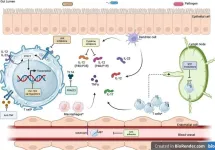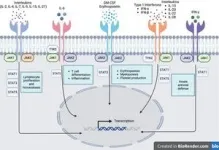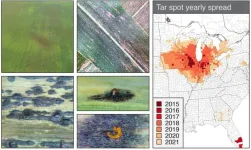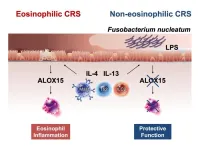Future therapies for managing inflammatory bowel disease
2023-11-06
(Press-News.org) Ulcerative colitis (UC) and Crohn's disease (CD) are chronic inflammatory bowel diseases (IBD) that affect the gastrointestinal tract. In recent decades, there have been significant advances in the understanding of IBD pathophysiology and the development of new treatments.
The International Organisation for the Study of Inflammatory Bowel Diseases (IOIBD) developed the Selecting Therapeutic Targets in Inflammatory Bowel Disease (STRIDE) programs, which recommend specific treatment goals for UC and CD in children and adults. These goals include clinical response and remission, endoscopic healing, normalization of C-reactive protein/erythrocyte sedimentation rate and fecal calprotectin, prevention of disability, restoration of quality of life, and normal growth in children.
The current mainstay treatments for IBD include immunomodulators, biologics (anti-tumor necrosis factor alpha (TNF-α) agents being the most commonly used), and other monoclonal antibodies such as anti-integrins and anti-interleukins (IL-12/23). However, primary and secondary loss of response to these therapies is a major recurring issue, with often diminishing returns in terms of efficacy for the next line of therapies prescribed.
Recently, there has been an influx of new and emerging medications entering the market that are showing promising efficacy results in patients with moderate-to-severe IBD who have previously failed to respond to multiple drugs. These novel and emerging therapies include:
Subcutaneous infliximab and oral anti-TNFα preparations: These drugs offer greater convenience and flexibility for patients compared to traditional intravenous anti-TNFα agents.
Antiadhesion agents: These drugs block the interaction between leukocytes and the intestinal lining, preventing inflammation.
Cytokine inhibitors: These drugs target specific cytokines that play a role in IBD inflammation, such as IL-12/23 and IL-17.
Janus kinase (JAK) inhibitors: JAKs are signalling proteins involved in a variety of inflammatory pathways. JAK inhibitors have shown promise in the treatment of IBD, but more research is needed.
Phosphodiesterase (PDE) inhibitors: PDEs are enzymes that break down cyclic AMP (cAMP) and cyclic GMP (cGMP), two signalling molecules that play a role in inflammation. PDE inhibitors have been shown to be effective in treating IBD in animal models, and clinical trials are underway.
Sphingosine-1-phosphate receptor (S1PR) modulators: S1PRs are involved in the trafficking of leukocytes to the intestinal lining. S1PR modulators have shown promise in the treatment of IBD in clinical trials.
MicroRNA-124 (miR-124) upregulators: miR-124 is a microRNA that has anti-inflammatory properties. miR-124 upregulators are being developed to treat IBD, but more research is needed.
These novel and emerging therapies offer new hope for patients with moderate-to-severe IBD who have previously failed to respond to multiple drugs. More research is needed to confirm their long-term safety and efficacy, but they have the potential to revolutionize the treatment of IBD.
See the article:
Kumar A, Smith PJ. Horizon scanning: new and future therapies in the management of inflammatory bowel disease.
eGastroenterology 2023;1:e100012. doi: 10.1136/egastro-2023-100012
About the eGastroenterology
eGastroenterology is a new, open-access, and open peer-reviewed BMJ Journal, which focuses on basic, clinical, translational, and evidence-based medicine research in all areas of gastroenterology (including hepatology, pancreatology, esophagology, and gastrointestinal surgery).
For more information, please visit: egastroenterology.bmj.com and follow us on Twitter (@eGastro_BMJ).
Sign-up to Email Alerts for eGastroenterology: https://emails.bmj.com/k/Bmj/jausu/egastroenterology
END
[Attachments] See images for this press release:


ELSE PRESS RELEASES FROM THIS DATE:
2023-11-06
- A multicenter study of the MD Anderson, Korea University, Yonsei University, and other institutions
- Establishing subtypes of gastric cancer classification to lay the foundation of personalized treatment
Professor Sang Cheul Oh of the Division of Oncology/Hematology, Department of Internal Medicine, Korea University College of Medicine, Professor Sang‑Hee Kang of the Department of Surgery, Korea University’s Guro Hospital, and Professor Sun Young Yim of the Division of Gastroenterology and Hepatology, Department of Internal Medicine, Korea University College of Medicine announced a new genetic classification system ...
2023-11-06
ABSTRACTS: 1534, 777, 1328, 1526, 1330, 545
HOUSTON ― The University of Texas MD Anderson Cancer Center’s Research Highlights provides a glimpse into recent basic, translational, and clinical cancer research from MD Anderson experts.
This special edition features oral presentations from the Society for Immunotherapy of Cancer (SITC) 38th Annual Meeting focused on scientific advances and breakthroughs in cancer immunotherapy from MD Anderson-led studies. Highlights include fecal microbiome transplants ...
2023-11-06
LAWRENCE — The story of Ekgmowechashala, the final primate to inhabit North America before Homo sapiens or Clovis people, reads like a spaghetti western: A grizzled and mysterious loner, against the odds, ekes out an existence on the American Plains.
Except this tale unfolded about 30 million years ago, just after the Eocene-Oligocene transition during which North America saw great cooling and drying, making the continent less hospitable to warmth-loving primates.
Today, paleontologists from the University ...
2023-11-06
First reported in 2015, tar spot is an emerging disease on corn that has rapidly spread across the United States and Canada, causing tremendous yield loss estimated at $1.2 billion in 2021 alone. Tar spot gets its name from its iconic symptoms that resemble the splatter of “tar” on corn leaves, but these spots are in fact brown lesions formed by the fungal pathogen Phyllachora maydis. This destructive pathogen is challenging to research because it cannot survive outside its plant host; therefore, little information is currently known about the mechanisms that contribute to its disease cycle including spore formation, reproduction, and plant ...
2023-11-06
Open wounds, whether caused by accidents or from medical procedures like surgery, require proper management to speed up healing and prevent infections. While sutures and staples are common wound closure methods, they can cause secondary tissue injuries, potentially leaking fluids and gases and requiring anesthetics. Tissue adhesive glues are a more attractive alternative but often suffer from toxicity and weak adhesion.
Fortunately, tissue adhesive patches offer an innovative solution. They allow precise control of adhesion and mechanical properties through adjustable polymeric compositions. These patches can also deliver ...
2023-11-06
Like other countries in the world, Japan has witnessed a worrisome increase in the prevalence of chronic rhinosinusitis (CRS) over the last decade. An inflammatory disease that lasts at least 12 weeks, CRS can cause nasal congestion, nasal discharge, trouble breathing through the nose, facial pain, and even loss of sense of smell. Unfortunately, treating CRS is complex since the disease manifests in various forms. CRS can be categorized into eosinophilic (ECRS) or non-eosinophilic (non-ECRS) types. In ECRS, the nasal and sinus tissues exhibit an increased presence of eosinophils, a type of white blood cell that releases inflammatory ...
2023-11-06
Research Highlights:
American Indian and Alaska Native adults had significantly higher death rates from premature heart attacks compared to white, Black and Asian/Pacific Islander adults in the U.S., according to an analysis of more than 370,000 heart attack deaths from 1999-2020.
In addition, despite an overall decrease in heart attack death rates among American Indian and Alaska Native adults during the last two decades, heart attack-related deaths in American Indian and Alaska Native adult men younger than 55 years old and women younger than 65 years old did not decrease.
Embargoed until 4 a.m. CT/5 a.m. ...
2023-11-06
Research Highlights:
A child’s race, ethnicity and/or the neighborhood where they live may have an impact on their survival and recovery after a cardiac arrest.
Black children were more than four times more likely to experience a cardiac arrest compared to white or Hispanic children.
Children from neighborhoods with the highest socioeconomic status had the best odds of surviving and functioning well after a cardiac arrest.
Embargoed until 4 a.m. CT/5 a.m. ET, Monday, Nov. 6, 2023
DALLAS, Nov. 6, 2023 — Children’s ...
2023-11-06
Research Highlights:
As more people across the U.S. use marijuana for medical and recreational reasons, two new studies suggest its regular intake may damage heart and brain health.
In one study, daily use of marijuana raised the risk of developing heart failure by about one-third, even after considering other factors, compared to people who reported never using marijuana.
In a second study, older people with any combination of Type 2 diabetes, high blood pressure and high cholesterol who used marijuana, ...
2023-11-06
Research Highlights:
In a small study of adults living in rural America, those who identified as transgender were more likely to have cardiovascular disease risk factors, including tobacco use, obesity, high blood pressure, Type 2 diabetes or insulin resistance, high cholesterol and/or alcohol use.
Study participants with the highest odds of having cardiovascular disease risk factors were transgender males.
The findings highlight the need for interventions focused on reducing health disparities among the transgender population, researchers said.
Embargoed until 4 a.m. CT/5 a.m. ET, Monday, Nov. 6, 2023
DALLAS, Nov. 6, 2023 — Transgender ...
LAST 30 PRESS RELEASES:
[Press-News.org] Future therapies for managing inflammatory bowel disease






